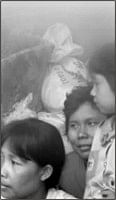Human Rights Advocacy
In solidarity with human rights defenders
Taskin Fahmina
 |
Photo: Forum-Asia |
It was a bright Saturday morning on 6th October 2007. I went to my office to check on any last minute work and then rushed to the airport. I was going to participate in the 11th Annual Asian Training and Study Session for Human Rights Defenders (ATSS), which took place in Bangkok from 7-27 October. The training programme was arranged by Forum Asia, a regional human rights network consisting of 40 organisations belonging to 15 countries of Asia.
In the aeroplane, the passenger next to me was a Bangladeshi, going to Malaysia for the first time. The flight attendant distributed embarkation forms, which he had difficulty in filling out, since he was unable to read or write, and could only sign his name in Bangla. I helped him to some extent, while thinking about the fate of these Bangladeshi youths as many of them are helpless and unemployed and have decided to leave the country failing to find suitable jobs. Many of them become victims of unscrupulous manpower agencies and middlemen who make quick money by exploiting them. In many cases, they find themselves 'undocumented' in host countries. Sometimes they have to work in extremely hazardous conditions and are subject to exploitation. Furthermore, in some cases, even though they have valid visas and work permits, they cannot join their jobs and are deported. These young men face serious human rights violations.
At the inaugural ceremony on 7 October, I met all my fellow human rights defenders who came from 15 different Asian countries and were united in the same spirit: “to protect and promote human rights”. The thirty-four human rights defenders represented different organisations of Bangladesh, Sri Lanka, India, Burma, Nepal, Tibet, Thailand, the Philippines, Indonesia, Malaysia, South Korea, Laos, Cambodia, Mongolia and Timor Leste.
The 21-day intensive training course reflected on various forms of human rights violations in different Asian countries and on how to uphold human rights there. The training course covered topics such as: historical evolution of human rights; domestic and international human rights protection mechanisms; universality of human rights; Asian values and the concept of responsibility to protect; gender and women's human rights; human rights defenders: challenge and situation; UN Human Rights System and mechanism; humanitarian law; principles of community organising; guidelines on advocacy; and cyber campaign strategies.
To gather practical experience we went for a field visit to Klong Dan and then to an urban slum community in Bangkok. The Klong Dan sub district consists of 14 villages with a total population of 30,000 people. Their main livelihood is coastal fishing. However, the Government of Thailand decided to build a wastewater plant in the area, funded by the Asian Development Bank (ADB) without consulting its inhabitants . If this project becomes activate, industrial wastewater will be processed and released in the sea, unbalancing the eco-system and having an adverse effect on mussels and other shellfish. As a result, this may have a direct negative impact on the livelihood of the fishermen of the Klong Dan community. Aware of the consequence of the project, the community has been fighting against it and a case is pending in the court since 1998. After the visit to Klong Dan we went to visit the slum Pra-ves in Bangkok. The inhabitants of this slum are fighting against an eviction drive.
The training session was very interesting and helped defenders to develop their skills. We demonstrated in front of the Burmese Embassy against the killing of Burmese people, for the freeing of all the political arrestees and to bring back democracy in Burma. We also videoed the demonstration and made animation pictures to highlight the violence in Burma. We also went to observe the 30th commemoration of the October uprising Anniversary in Bangkok. People gathered at Sanam Luang to commemorate the 30th anniversary of the student uprising of October 14, 1973, which toppled the dictatorship. We visited the United Nations Economic and Social Commission for Asia and Pacific ( UNESCAP) office in Bangkok. UNESCAP advocates for greater private sector involvement in infrastructure development and it monitors progress of, and provides advice to, countries pursuing the UN Millennium Development Goals. In the UNESCAP office we came to know about the human rights work carried out by the UNDP,UNIFEM, UNESCAP and UNHCR.
In the training programme, the Rapporteur of the Democratic Republic of Korea and a teacher of Chulalongkom University Mr. Vitit Muntarbhorn, gave his lecture on Asia regional human rights mechanism. We also had elaborate training on how to use UN mechanism and tools on advocacy and human rights issues. We had excellent resource persons and facilitators who made the training interesting and understandable to all.
The 21 days flew by. Soon it was time to return home, time again to serve my country's people and help ensure human rights. We promised to keep in touch and network, in solidarity with all the human rights defenders.
The author is working with Odhikar, a human rights organization.